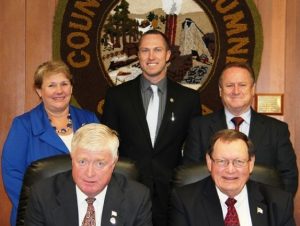Sonora, CA – Faced with what a month ago was estimated as a potential $4.9 million budget deficit, the Tuolumne County supervisors today heard the word “furlough” included among new budget-balancing scenarios to consider.
When staff presented the supervisors with the initial deficit and “net problem” figure of around $3.5 million back on April 3, potential strategies were also discussed for developing the FY 2018-19 budget. This morning, County Administrator Craig Pedro asked the board to weigh in on two new possible scenarios to get to a balanced general fund budget for approval later this year. The current timeline for that includes two more budget sessions May 15 and June 5 ahead of approving a finalized preliminary budget June 19. Slated Sept. 4 is a budget hearing and adoption of the final budget.
On a related topic, just before Pedro’s presentation, the supervisors unanimously voted to approve slightly amended budget policies that more clearly define best practices for saving and paying off debts. Among these are establishing general reserves at five percent of the total operating budget for governmental funds, which calls for targeting to set aside a minimum of $250,000 annually until the reserve is fully funded.
Fiscal Straits Far From Dire
Ahead of that vote, while noting about this year being an election year — rife with comments and spears thrown over budget-balancing concerns — Supervisor Karl Rodefer stated that is also just another normal budget year. He said, “We are not doing anything abnormal — we have changed our practice a little bit…have a finance committee that is involved in the budget preparation that provides some additional public transparency to our process – and we have been very transparent in our process. I do not want the public to think that this county is in any way shape or form or really ‘upside down’.”
Continuing, he admitted the county has important considerations that must be dealt with, also pointing out that some of the issues were state-imposed. Ultimately, Rodefer stressed, “If you take a look at Tuolumne County with respect to any other county…certainly of the size and scope…we are far and away in better financial straits than any of our sister counties…and I am confident we are not going to have any problem balancing this budget.”
Pedro prefaced today’s presentation comments by echoing Rodefer’s. “This is a normal process. We used to do the developmental behind the scenes. So what people are seeing is the very raw development of a budget in a way they have never seen it and folks do need to take a look at it in that context,” he maintained. Currently taking funding requests from departments, he dryly noted that over decades of budget processes he never had fewer requests than funding. As a matter of course, “We are tuning that down… we have always balanced our budgets in Tuolumne County.”
Possible Budget Balancing Scenarios
Pedro’s two new scenarios included dealing with $400,000 in one-time capital costs related to the construction juvenile facility by resolving it with a one-time revenue, likely in the form of a fund balance; also handling the $316,000 net costs of the county’s projected personal use cannabis enforcement personnel by considering it as a given cost to resolve in the overall balancing of the budget. Doing this, Pedro advised, would reduce net problem to just over $2.8 million.
Adding to that scenario, Pedro introduced the possibility of further reducing the deficit by $470,000 through implementing furloughs. He quickly added not using the option for more than a year, targeting furlough days to occur around the holidays when workload is less and spreading the time over the year. Supervisor Evan Royce was the only board member to enthusiastically endorse the idea of furloughing, pointing out that it was a better option than eliminating positions. The rest of the supervisors indicated it should be considered as a last-ditch option.
Piping in, County Auditor-Controller Debi Bautista offered that using a one-time fund balance could be a more effective alternative since furloughing requires intensive and involved internal work for her office.
Ahead of the board giving a unanimous go ahead for Pedro to explore all the options brought up, Supervisor Randy Hanvelt shared that he and Bautista would be taking part as members of a negotiating team with members of RCRC and others to work more effectively with CalPERS. Among the chief goals he said will be to address and stabilize problematic issues that contribute to the county’s budget variabilities. As he explained, “We want them to set policies for once and all and let us live with them.”


